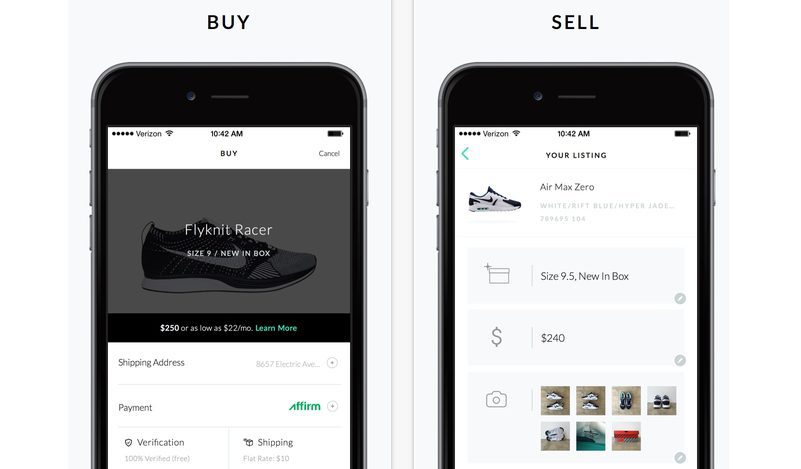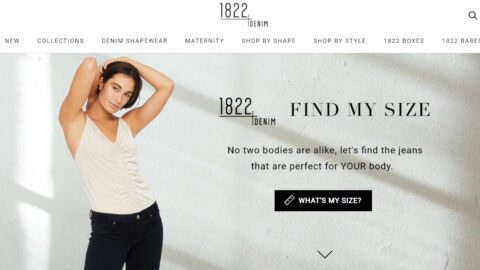Making purchases through marketplaces can be risky. Unlike shopping at a retail store, consumers are often buying a product from an individual seller, heightening the chance for the buyer to purchase a counterfeit or improperly listed item.
To take the risk out of purchasing sneakers, which can cost hundreds of dollars for one pair, Eddy Lu and Daishin Sugano co-founded GOAT, an online marketplace dedicated to safe transactions for sneakers. In getting the marketplace off the ground, the co-founders looked to cater to the large Millennial demographic of “sneakerheads,” consumers who collect sneakers as a hobby.
In part because many of these sneakers are expensive, these young consumers often don’t make larger payments in one swoop. With that in mind, GOAT partnered with consumer lending platform Affirm to power its payment system and enable an alternative credit payment method.
“We were looking for a partner that served people that were underbanked in terms of not having credit,” Lu said in an interview with Retail TouchPoints. “In our industry, since the sneakers are expensive, especially if you’re a collector, we have a lot of customers that want to buy rare sneakers before their value increases, but don’t really have the cash up front and don’t want to run up extensive credit card lines. Affirm was a natural fit for that.”
The integration of the Affirm payment system did wonders for marketplace purchases. Whereas the average order value for purchases through GOAT was in the mid-$200s before the Affirm integration, this value has since increased approximately 30% into the low $300s, according to Lu. Additionally, shopping cart conversion rates have lifted 25% now that GOAT gives the option of paying with Affirm.
Affirm enables shoppers to pay for a purchase via a debit card, bank transfer or check without their having a traditional credit score. The lending platform enables buyers to borrow at the POS and pay off purchases incrementally, offering the choice of three-, six- or 12-month payment plans.
The platform uses its own proprietary model to decide whether a consumer can take out a loan for a purchase. Depending on the score determined, Affirm can offer interest rates that vary from 10% to 30%. While customers can take out multiple loans at once, each Affirm loan application is evaluated separately as a closed-end transaction.
“GOAT’s mission to provide a safe way to buy and sell sneakers really resonates with Affirm’s overall values of bringing honesty and transparency to the payments industry,” said Edward Lin, Director of Marketing at Affirm. “With Affirm, shoppers on GOAT can buy the authentic sneakers they love with the peace of mind that they’re not being ripped off by their retailer or financial institution.”
Lu cited a Bankrate survey indicating that 63% of Millennials don’t have a credit card as a major reason for the marketplace’s push toward integration with Affirm. Additionally, Lu and Sugano heard from many of their customers that they’d rather use PayPal or other services versus paying with a credit card. “We knew that providing more options for them was the way to go,” he said.
“We want to be eBay 2.0 for the Millennials growing up now,” Lu said. “When we were doing our research, we noticed that Affirm actually focuses on the Millennial generation as well. They want to be the credit platform for Millennials that are jaded by high-interest rate credit cards. The messaging really worked because they were focused on the same target demographics.”
The GOAT marketplace is designed to bridge the anonymous gap between the buyer and the seller, by creating a trustworthy service designed to eliminate fraudulent purchases. GOAT includes a Buyer Protection Program that guarantees all transactions are trustworthy and safe, with purchases of more than $300 sent to a specialist to ensure the shoes are authentic. GOAT also has a lower commission rate (9.5%) than eBay (13%), giving sellers an opportunity to make a higher net profit by listing their shoes on the site.
“We’re trying to change the marketplace to an Uber model, where you order a taxi and you don’t care who picks you up because you trust in the system,” Lu concluded. “All of the listings on our site are SKU-based, so if you’re just clicking a Jordan 5 shoe, you see the clear photos related to the shoe, and you see all the sizes the sellers are selling. We are building in trust as the most important model in our marketplace. A consumer should not care if they buy a shoe from me or you, they should care that they are getting a new Jordan 5, size 11.”













